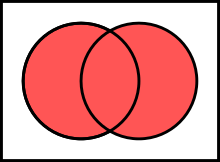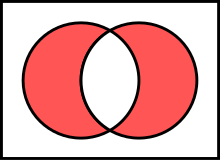Affirming a disjunct
The formal fallacy of affirming a disjunct also known as the fallacy of the alternative disjunct or a false exclusionary disjunct occurs when a deductive argument takes the following logical form:[1] Or in logical operators: WhereThe fallacy lies in concluding that one disjunct must be false because the other disjunct is true; in fact they may both be true because "or" is defined inclusively rather than exclusively.It is a fallacy of equivocation between the operations OR and XOR.[2] The following argument indicates the unsoundness of affirming a disjunct: This inference is unsound because all cats, by definition, are mammals.A second example provides a first proposition that appears realistic and shows how an obviously flawed conclusion still arises under this fallacy.


formal fallacydeductivelogical formlogical operatorslogical assertionVenn diagraminclusive orexclusive ordisjunctequivocationdisjunctive syllogisminferenceVogue MagazineExclusive disjunctionLogical disjunctionSyllogistic fallacyfallaciesFormalpropositional logicAffirming the consequentDenying the antecedentArgument from fallacyMasked manMathematical fallacyquantificational logicExistentialIllicit conversionProof by exampleQuantifier shiftAffirmative conclusion from a negative premiseNegative conclusion from affirmative premisesExclusive premisesNecessityFour termsIllicit majorIllicit minorUndistributed middleInformalFalse equivalenceFalse attributionQuoting out of contextLoki's WagerNo true ScotsmanReificationCircular reasoningBegging the questionLoaded languageLeading questionCompound questionLoaded questionComplex questionCorrelative-basedFalse dilemmaPerfect solutionDenying the correlativeSuppressed correlativeIllicit transferenceCompositionDivisionEcologicalSecundum quidAccidentConverse accidentFaulty generalizationAnecdotal evidenceSampling biasCherry pickingMcNamaraBase rateConjunctionDouble countingFalse analogySlothful inductionOverwhelming exceptionAmbiguityAccentFalse precisionMoving the goalpostsSlippery slopeSorites paradoxSyntactic ambiguityQuestionable causeAnimisticFurtiveCum hocPost hocGambler'sInverseRegressionSingle causeTexas sharpshooterLaw/LegalityProof by assertionConsequencesArgumentum ad baculumWishful thinkingEmotionChildrenFlatteryNoveltyRidiculeIn-group favoritismInvented hereNot invented hereIsland mentalityLoyaltyParade of horriblesStirring symbolsWisdom of repugnanceGenetic fallacyAd hominemAppeal to motiveAssociationReductio ad HitlerumGodwin's lawReductio ad StalinumBulverismPoisoning the wellTu quoqueWhataboutismAuthorityAccomplishmentIpse dixitPovertyWealthEtymology